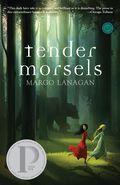 As a reader, there are few better moments than the first time you discover the work of a writer you immediately love and know you'll follow for years to come. Reading the first story in the short story collection Black Juice, "Singing My Sister Down," was that moment for me with Margo Lanagan (and I know for a bunch of others). I've yet to be disappointed, and don't expect to. Margo tells brave, wise, outrageously beautiful stories filled with terrible, wonderful things. Her novel Tender Morsels (Amazon | Indiebound) is one of those books I know I will return to over the years, finding something new every time. All by way of saying I'm happy to host the final stop on Margo's blog tour for its paperback edition. Now, as usual, I asked for process porn–I know you all love it so–but instead what Margo has written is an essay about having various editions of one's books and, also, about process. (It's a difficult topic to escape*.) So, welcome, Margo!
As a reader, there are few better moments than the first time you discover the work of a writer you immediately love and know you'll follow for years to come. Reading the first story in the short story collection Black Juice, "Singing My Sister Down," was that moment for me with Margo Lanagan (and I know for a bunch of others). I've yet to be disappointed, and don't expect to. Margo tells brave, wise, outrageously beautiful stories filled with terrible, wonderful things. Her novel Tender Morsels (Amazon | Indiebound) is one of those books I know I will return to over the years, finding something new every time. All by way of saying I'm happy to host the final stop on Margo's blog tour for its paperback edition. Now, as usual, I asked for process porn–I know you all love it so–but instead what Margo has written is an essay about having various editions of one's books and, also, about process. (It's a difficult topic to escape*.) So, welcome, Margo!
NOTE: First three U.S. commenters will be sent a copy from the publisher!
Gwenda, I know you usually ask people to talk about their writing process, especially for the book in question, but honestly, I’ve written and talked so much process-porn about Tender Morsels, there is really nothing new to say – and I want you to have new stuff!
So, let’s talk about the weirdness that is new editions. It was pretty weird for me to have two editions of Tender Morsels come out (US hardback and Australian adult) in October 2008, and then two more hardback editions published in the UK (by David Fickling as YA and as adult by Jonathan Cape) in July last year. I don’t publish a whole bunch, and I’m used to maybe a new cover every couple of years, so to have four different covers for the same book felt a bit excessive (in a wonderful way, of course!). And to watch the different reactions to the book when it was marketed as YA and as adult was interesting, especially the very strong reaction both for and against it as a YA book in the UK.
Now, with the fuss over challenging-YA-book-wins-World-Fantasy-Award well and truly died down, it’s time for the Knopf paperback edition to come out, and for the novel to be published in Australia as YA (by Allen & Unwin) – both of these with gorgeous new covers, of course. And soon the UK paperbacks will be out, too. So the thing proliferates, wrapping itself in cover after cover like a vaudeville actor undergoing costume changes.
 This is mild stuff; this is very small beer. I don’t know how really-properly-famous-bestsellery-authors keep track of all their different editions – they must have assistants to remind them exactly which and with whom and for whom and when etc. Especially prolific authors, who would by this time have published something else and be just about finished the book after that, plus have backlist reissues happening all the time – how do they even remember what it was like to put that story, two books ago, together? I mean, I can remember the writing of Tender Morsels, pretty much month by month, throughout 2007, but that was because it was my first novel for 10 years, and a struggle. For a novel that flows easily, that just falls out of you (as this next one of mine – due end March – seems to be doing, yay!), what’s to grip onto?
This is mild stuff; this is very small beer. I don’t know how really-properly-famous-bestsellery-authors keep track of all their different editions – they must have assistants to remind them exactly which and with whom and for whom and when etc. Especially prolific authors, who would by this time have published something else and be just about finished the book after that, plus have backlist reissues happening all the time – how do they even remember what it was like to put that story, two books ago, together? I mean, I can remember the writing of Tender Morsels, pretty much month by month, throughout 2007, but that was because it was my first novel for 10 years, and a struggle. For a novel that flows easily, that just falls out of you (as this next one of mine – due end March – seems to be doing, yay!), what’s to grip onto?
Because the process itself is kind of mysterious; if the writing is going well, it kind of feels as if the story is happening because you’ve stepped to one side and are letting it happen, rather than that you’re bodily pushing it along. There are not many points where you step in and make conscious decisions. I don’t, anyway. I kind of play around at the start (with both stories and novels – oh look, here I am talking process! how’d that happen?), then when I feel confident enough of the mood, general direction and some of the characters, I do step in and make a kind of a plan, keeping it fairly squishy so it’s not predictable enough to take all the surprises out of the writing. And then, for a short story I fix my eye on the end point and let the rest happen; for a novel I kind of wallow, and try to keep the process playful and not-a-chore and not close off too many possibilities. I’m not a highly technical, front-brain kind of writer, I’m more grunty and instinctive; all the clever, connecting-type stuff happens at a subconscious level and surprises me as much as it does my readers, how it all seems to work together at the end!
So, looking back and talking about process (especially from such a distance) feels to me somehow wrong-headed, because although, yes, there’s a lot of head involved, the main direction of the process is not happening anywhere that can be seen. Happily fumbling around in the dark for the next bit of dialogue is not really a spectator sport, and neither is screwing up your face because you got a scene wrong, and going for a brisk walk and watching the alternative path through that scene unroll before you. Nobody who doesn’t already do that habitually is going to understand what you mean when you try to describe it; and anyone who does is quite happily doing their own fumbling and striding about, and probably doesn’t need your reassurance.
Yes, so, new editions? Pretty, but a little puzzling for the author who once was inside that story, engineering its many possible resolutions, and is now firmly outside the single version that survived, and up to her ears in something else, a setting with a whole different climate and shape, a group of entirely characters with a new set of tortures to undergo.
New editions of Tender Morsels? I love them all, and I still stand by the story inside all those covers – I think it’s knobbly and meaty and interesting, and I still love all the magic bits. I hope the new paperback and YA editions find their way even farther out into the world, and that more and more people get to chew on them.
Visit Margo's previous stops:
Through A Glass, Darkly
Steph Su Reads
Bildungsroman
Cynsations
The Story Siren
(*I think every writer feels a bit suspect talking about process–we're storytellers, after all–which is one of the things that makes it so fascinating for other writers to read. And, really, it all circles back around in one way or another, since without the making, there's nothing.)


